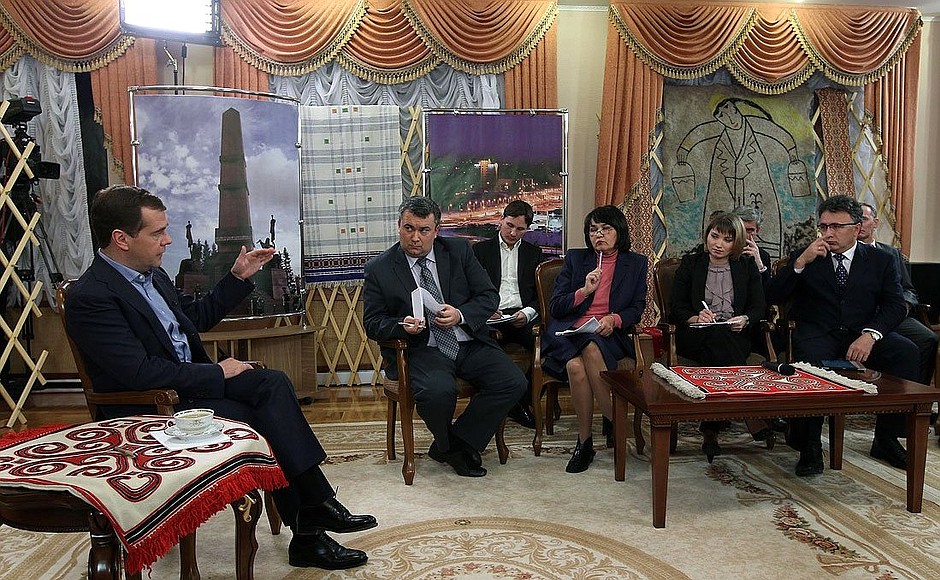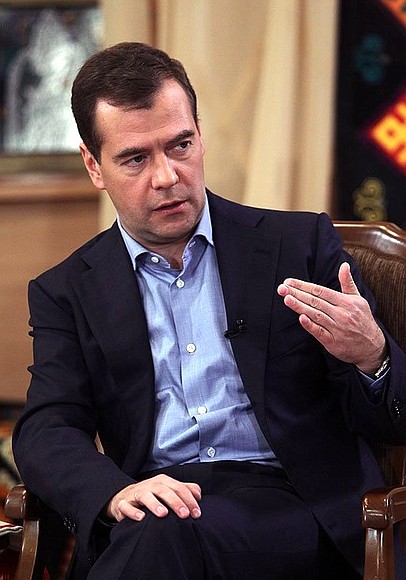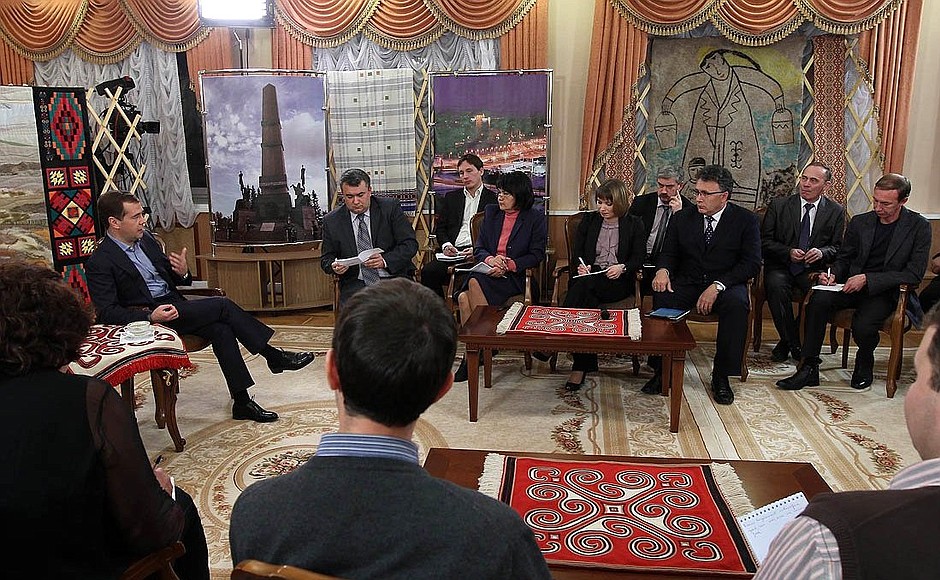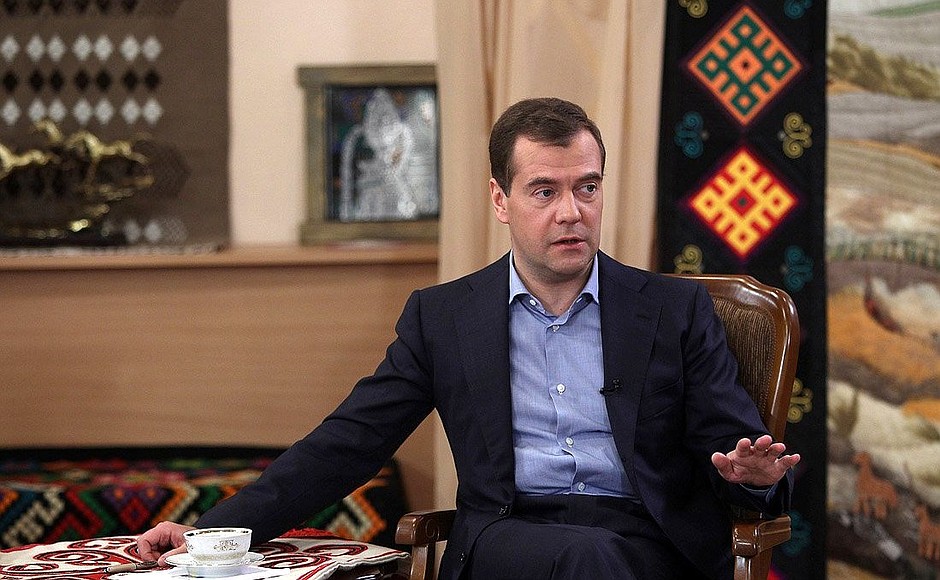This is Dmitry Medvedev's second meeting with representatives of regional media outlets. In Khabarovsk, the President talked with journalists from the Far East and Siberia.
* * *
Excerpts from transcript of meeting with journalists from the Volga Federal District
President of Russia Dmitry Medvedev: I have said on many occasions that our investment climate is not particularly good, to put it mildly. We have achievements to our name in the economy, both during and before the crisis, real achievements. We have achievements in the social sector too, and it would be unfair to pass over these things in silence. But unfortunately, I think that, to be honest, the investment climate here is genuinely worse than the country’s overall economic situation.
This creates a paradox. We are perceived as being worse than we actually are, worse than our laws and regulations are in reality. People think that everything is total chaos and arbitrariness here. I am not trying to say that we do not have problems, but they are not that bad. For all the criticism you can level against them, our courts do function and rule on cases. It is possible to challenge civil servants’ unlawful actions. Competent economic decisions are being taken. And let me even go so far as to say that the whole system for preparing and presenting documents required for investment decisions has become more modern.
When we began this modernisation work, most investment decisions took months, even years in the capital cities. Just think, years! It’s simply crazy. But the time it takes has been cut several-fold now. I’ve seen the statistics, and they show that the time it takes has been reduced in practically every region. The one-window system is working too now, not ideally, but it is working.
It would therefore be unfair to say that “you take decisions but everything is only getting worse.” I hear people say sometimes that “everything is getting worse,” but this is not a fair portrayal of the situation. Things are not getting worse. They are getting better, even though the investment climate remains far from ideal. As I said, it genuinely is worse than the overall economic situation.
When you think about it, our economy today is looking a lot healthier and more robust than many of the European Union’s economies. We have inflation more or less under control. Yes, it is still at a high level compared to inflation in Europe, but it is under control and is coming down.
This year, we will have the lowest inflation rate in our country’s modern history, a rate of around 7 percent. Let me remind you that inflation was running at 1,500 percent 20 years ago.
Our GDP is growing and this year will be 4–4.5 percent, as compared to 0–1.5 percent in the EU countries. We have a decent debt to GDP ratio – 12 percent – and this is an important indicator. This ratio is between 80 and 100 percent in most of the developed European countries.
We have a stable currency that is freely bought and sold. This makes it possible for our people to make reserves in the national currency, as in foreign currencies. There are plenty more examples. But we are perceived in a poorer light than many other countries. This is not our fault, but is no doubt the misfortune we have to live with, cope with and overcome. We need to make a lot of effort for this, a lot more effort yet. I think that we need to put effort and resources into promoting Russia’s economy, and we will do this.
* * *
I agree that this [interethnic relations] is a serious and sensitive issue. This really is in large measure a question of our country’s very survival. Monoethnic countries, which usually have just one main religion, have an easier time in this sense, although they too can have their problems, problems with immigrants, for examples, and we know of such cases.
Our country was complex in its makeup right from the start. At the same time, as I discussed at a recent meeting with our muftis, if you take European countries, tectonic shifts in the ethnic and religious makeup there are a real challenge, and they do not know how to respond. This is a new situation for them.
And what about Russia? We have had people of different ethnic groups and religions living side by side practically from the moment our country was formed (give or take a thousand years, though this is all very conditional). However you look at it, Christians and Muslims, certainly, have been living together here for a very long time now.
For both Christians and Muslims, this vast country of ours is their historic homeland. They did not come here from elsewhere, and it was here that they accepted the Christian or Muslim faiths. This is good, for it shows that our ability to live together was formed not just during the Soviet period, but dates back through the centuries. We know that the Muslim spiritual board emerged in Ufa a very long time ago, and this is something we must not forget.
You spoke about principles, the constitutional principles of mutual respect, equality of our peoples, respect for and preservation of history, and respect for people’s different faiths and ethnic backgrounds. This is all very clear and there is no need to think up any new principles here. We simply need to make sure that the infection of interethnic conflict does not spread. Sadly, these problems do emerge and spread, sometimes fuelled by subjective reasons, because we have a big country after all, and crimes take place every day and in every region, though they differ a lot in the reactions they stir.
Crimes in which no ethnic element is involved don’t seem to draw much attention, even if they are serious crimes such as murder. Such crimes pass by in silence and no one seems to care much, though this is wrong, because the death of any person is always the greatest tragedy. But when even minor crimes involving interethnic conflict or people from different ethnic groups take place, you immediately hear people laying the blame on this or that group. This is a destructive thing for our country.
Whether in Moscow or any part of the country, we therefore need to take extraordinary measures to make sure that not only do we not lose this centuries-old experience of living together, but strengthen it. The diaspora communities and the main ethnic groups all play a big part here. Whether in Moscow, Ufa, Kazan, or Vladivostok, the community leaders need to help the authorities resolve these problems.
It is also very important to get migrants involved in normal life and help them in their social adaptation. I talked about this too with the muftis. They are concerned about the situation in Moscow and other places, and we all are. We need migrants because we do not have enough people to meet our labour market needs, and this is the way things work around the whole world. We cannot cover our needs without the help of migrants.
Our own citizens, regardless of their ethnic group, do not want to do low-qualified jobs, even when the pay is not so bad. This means that migrants will come to fill the gap. They are useful to us, but they need to come under conditions that will not create tension. The system needs to be in place to help them socially adapt, and they need to be ready to accept our traditions, and I am not talking about religious traditions in this particular case.
As we have discussed before, even within one faith people differ a lot from each other. Muslims in Ufa are not quite the same as Muslims in Saudi Arabia, and Christians in Moscow are not the same in way of life, habits, and thinking, as Christians in, say, Canada. This is also something we need to remember.
When you are someone’s guest, you accept their rules, their written and unwritten codes of behaviour. This is simply people’s duty. If people cannot do this, they should leave, and if they came without permission, they should be deported. We are being perfectly clear about this, and no one should have any doubts on this matter. As for cases when crimes are committed, the guilty parties will be brought to answer. The authorities in every region must act on this basis.
* * *
On the subject of civil society, you can give its current state differing appraisals. I will say what I have said before, because I think it conveys the situation most accurately: the level of our civil society’s development reflects the level of society’s development in general. Such is the society, such are its people, and such is the level of communication between them. If you compare the situation to the kind of communication we had back in the 1980s, you could say we have made colossal strides forward. But if you compare us to some of the more advanced European countries, you could say we are still lagging behind.
I am not even referring to the internet community and the people actively engaged in all of the social networks. I am referring to the general climate and relations. I think the general climate depends ultimately on the degree to which people perceive public problems as their own.
People take different attitudes towards NGOs. Some people like and support them, others don’t see any point in their work, and others again see them as all but enemies of the people and the authorities because they live on foreign money or whatever. But all around the world, NGOs fulfil the single and very important mission of helping the authorities to resolve the tasks that no government can tackle alone.
A state that attempts to decide everything for everyone is a very weak state. We had such a state, a state that regulated everything from top to bottom, set all the parameters of life, decided even who you could marry. I think it is time we forgot this state. We need to build a state that will let civil society develop according to its own laws.
Let me give the concrete example of the Sochi Olympics. We are spending a lot of money on what we hope will be a memorable celebration of sports that everyone will enjoy watching. At the same time, this is a huge and complex undertaking. I am not talking about the construction work involved, which is a big enough task in itself. Organising the Olympics is a job that requires tens of thousands of volunteers. We have never had experience of volunteer work on this scale.
The traditional view has been that volunteers are potentially dangerous in that they might say or do the wrong thing. We do not have experience of building and developing the volunteer culture. This is a distinct culture in which you accept to work for free for the public good, work not for yourself, but for others, for people.
A primitive market mentality started to dominate here. People would accept to go and do something, take part in work only in return for money. “We’ve got a market society now,” they’d say, “if there’s no money involved, I won’t do it.” But this not the way things work elsewhere in the world. People take part in all forms of socially useful work at the call of their heart. This is something that simply needs to be properly organised.
Let me give another example: raising money for the disabled or the elderly. This is the sort of thing that no government can completely handle alone. Even the biggest and richest economies cannot do all of this work alone. But this work requires the creation of the right instruments for socially oriented NGOs. This is the civil society we are talking about, the possibility for NGOs to get breaks and incentives, so that they can raise money and spend it in transparent fashion on senior citizens, children, and the disabled. This is what civil society is all about.
Civil society is not at all just some closed party, where people discuss issues with the authorities, debate about who was sent to prison and who was not, declare themselves ‘for’ or ‘against’. Civil society is a mass-scale movement of people working for change and normal life. These things can be expressed through political activeness too, but I think political activeness needs to be expressed through the proper forms.
Civil society and political life are close but not completely identical spheres, because political life takes place within a particular framework. If you seek victory in elections and want to change the government, after all, you need to act within the existing laws governing political life, establish your party or try to get your people elected to parliament and elected to office, whether that of president or that of village elder. Civil society activeness, on other hand, is a bit different in nature.
I think that when we learn to understand these things we will have a developed a civil society.



